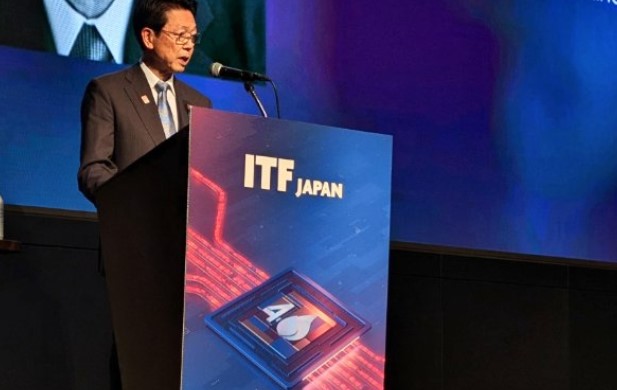
(Photo : x.com)
Japan's Minister of Economy, Trade and Industry (METI) Yoji Muto
- Japan's government plans to invest $65 billion in domestic semiconductor and AI projects without raising taxes or issuing bonds.
- The funding strategy is a departure from traditional methods, indicating a commitment to support the tech sector without burdening citizens or increasing the deficit.
- The investment comes amid a global semiconductor shortage, positioning Japan as a potential leader in the market.
- This move continues Japan's history of supporting its tech industry and could reshape the global tech landscape.
In a significant move that has caught the attention of the global tech industry, Japan's government has announced a substantial financial plan to bolster its domestic semiconductor and artificial intelligence projects. The plan, which is valued at 10 trillion yen or approximately $65 billion, is a clear indication of Japan's commitment to advancing its technology sector. However, the funding method for this ambitious project has raised eyebrows and sparked discussions.
Yoji Muto, Japan's industry minister, made it clear on Tuesday that the government does not intend to increase taxes to finance this massive project. This statement came as a relief to many, as the fear of a potential tax hike had been looming. Muto's announcement has effectively put those concerns to rest, assuring the public and the industry that the government is exploring other avenues to fund this initiative.
The announcement of this financial plan was made by Prime Minister Shigeru Ishiba, who has been vocal about his vision to boost Japan's technology sector. The Prime Minister, however, stated that the government will not issue deficit-covering bonds to fund the plan.
Strategic Move Amid Global Tech Challenges
This decision is a departure from traditional methods of funding such large-scale projects and has sparked curiosity about the government's strategy for financing this initiative. The decision to not raise taxes or issue deficit-covering bonds is a strategic move by the Japanese government. It is a clear indication that the government is committed to supporting the technology sector without putting additional financial burden on its citizens or increasing the country's deficit.
The announcement of this financial plan comes at a time when the global tech industry is facing a significant shortage of semiconductors. Semiconductors, which are a critical component in a wide range of products from smartphones to cars, have been in short supply, causing disruptions in various industries. Japan's decision to invest heavily in its domestic semiconductor projects is a strategic move that could position the country as a leading player in the global semiconductor market.
The focus on artificial intelligence projects is also noteworthy. Artificial intelligence is a rapidly evolving field with immense potential. By investing in AI, Japan is positioning itself at the forefront of this technological revolution, ensuring that it remains competitive in the global tech industry.
Historical Context and Future Implications
This is not the first time that Japan has taken bold steps to support its technology sector. In the past, the government has implemented various measures to foster innovation and technological advancement. This latest financial plan is a continuation of Japan's long-standing commitment to supporting its tech industry.
In conclusion, Japan's decision to invest 10 trillion yen in its domestic semiconductor and artificial intelligence projects without raising taxes or issuing deficit-covering bonds is a significant development. It not only underscores the government's commitment to advancing its technology sector but also demonstrates its strategic approach to financing such initiatives.
As the world watches, Japan's bold move could potentially reshape the global tech industry and position the country as a leading player in the fields of semiconductors and artificial intelligence. This development is a testament to Japan's strategic foresight and commitment to sustainable economic growth, setting a precedent for other nations to follow.
* This is a contributed article and this content does not necessarily represent the views of btin.co.in









